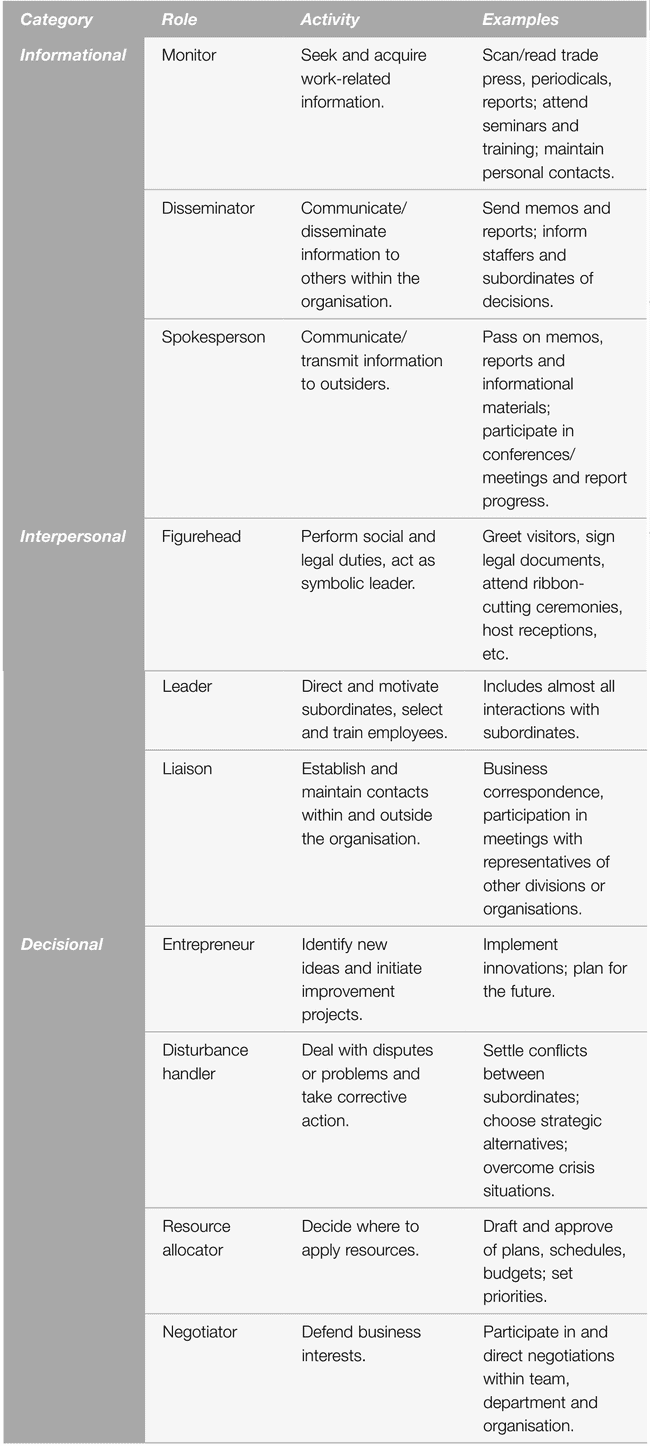Mintzberg’s managerial roles
The Mintzberg managerial roles are categorized under three sections—interpersonal, informational, and decisional
What exactly do managers perform in the workplace? Managers do three types of work, according to Henry Mintzberg: informational work, which entails sharing and disseminating information to those around them; interpersonal work, which entails working with individuals to get the most out of them; and decisional work, which entails making tough decisions. We can all become more effective managers if we understand the nature of these various positions.
When to use it
● To analyze the overall efficacy of your organization.
● To establish a training or development program for managers.
● To understand and critique your own management style.
Origins
At the MIT Sloan School of Management, Henry Mintzberg completed his PhD thesis on the daily work patterns of chief executive officers (CEOs). People had previously concentrated on management duties such as planning, organizing, controlling, and budgeting. Mintzberg was able to present a whole different view on the nature of management work by following executives around and watching how they actually spent their time.
His ideas quickly gained traction, spawning a whole field of follow-up research on the subject. Many people have moved their focus over the years to leadership, or how a CEO motivates others to follow him or her. However, understanding management, or the art of getting things done through others, remains crucial, and Mintzberg's early research on managerial responsibilities is where it all began.
Mintzberg made some key insights regarding how CEOs use their time at work when writing up his research on them:
● Managers work at a breakneck speed and are highly motivated to take action.
● They prefer verbal communication, such as phone conversations and meetings, to written communication.
● They spend the majority of their time with their subordinates and outside parties, and very little time with their superiors.
● Their activities are brief (an average of 9 minutes) and highly diversified and fragmented.
Mintzberg defined ten separate roles that CEOs play in their day-to-day work life based on these observations, as illustrated in the table below.

In summary, Mintzberg's research debunked many of the common misconceptions about what managers actually do at the time. He debunked the notion that CEOs thought through problems in advance or with great foresight; in fact, many of them work in a highly reactive and opportunistic manner, and they are used to being interrupted continuously.
Mintzberg's work influenced what became known as the'situational' leadership approach. In other words, rather than claiming that certain executives are better at leadership and management than others, he said that capacities are context-dependent. The most effective leaders are those who can adjust their behavior according to the situation.
How to use it
If you're a manager, Mintzberg's positions might help you think about your tasks more clearly. In each of the ten jobs, ask yourself two questions: "How much time do I actually spend doing this?" and "How much time should I spend doing this in an ideal world?" This simple analysis might help you figure out what to prioritize and what tasks you should minimize or avoid completely.
If you want to improve the efficiency of a whole organization, you can use Mintzberg's roles to create a management development program. Where do the company's management' skill sets have the most weaknesses? What kind of education do they require? Many firms, for example, discover that their managers are insufficiently skilled in leading others or in negotiating, which is quite useful in determining the suitable training program for them. Remember that these various functions are complementary; they build on one another and together provide a complete picture. Mintzberg claims that ‘The manager who only communicates or only conceives never gets anything done, while the manager who only “does” ends up doing it all alone.’
Top practical tip
Top pitfall
Notion Templates
Get this high quality templates to help you with implemenation!
Further reading
Mintzberg, H. (1983) The Nature of Managerial Work. Upper Saddle River, NJ: Pearson Education, Inc.
Mintzberg, H. (2012) Managing. Oakland, CA: Berrett-Koehler.
Tenbglad, S. (2006) ‘Is there a “new managerial work”? A comparison with Henry Mintzberg’s classic study 30 years later’, Journal of Management Studies, 43(7): 1437–1461.